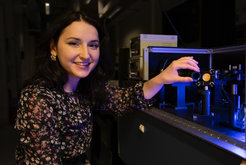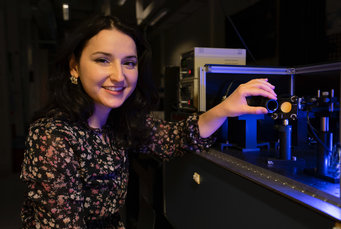Award-winning quantum random number generator
The MPQ Photonlab is once again awarded with the LeLa Prize of the Federal Association of German School Labs, this time in the category “experiment of the year”.
Party mood in our school laboratory PhotonLab. The German Association of School Labs (Bundesverband der Schülerlabore e.V.) awarded the team led by Dr Silke Stähler-Schöpf and Linda Qerimi a prize for the "Experiment of the Year". The LeLa award recognises outstanding achievements by school labs and school lab networks. The school lab entered the competition with its quantum random number generator experiment. Doctoral student Linda Qerimi set up the quantum random number generator as part of her admission thesis at LMU.

In the experiment, a laser emits light particles. These hit a beam splitter. There they are either reflected or transmitted. Next to the beam splitter are two detectors that record which event has taken place for each photon. A computer records each individual event as a number 0 or 1. "It is completely up to chance which path each individual photon takes," says Qerimi. The highlight of the experiment is that students can influence the photons by means of a "polarisation rotator", i.e. they can manipulate the binary sequence of the numbers 0 and 1. This means that randomness may not be so random any more. The task now is to find a setting for the "polarisation rotator" in which the randomness is of the highest quality. In this way, the pupils get a feeling for the phenomenon of randomness and quantum physics as a whole.
Pupils can get a further insight into the quantum random number generator with the digital development of the PhotonLab's Flipped Classroom Instruction. There, the students work out the basics independently (from home) and deepen their knowledge by experimenting in the student lab.












